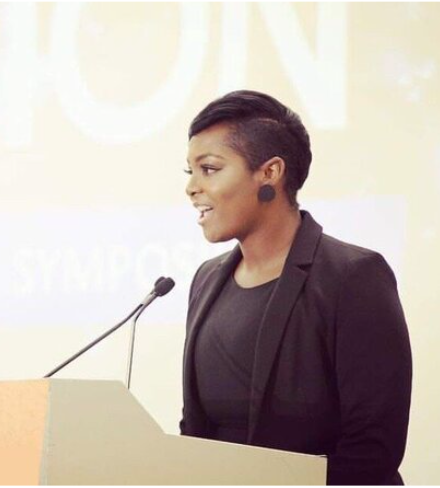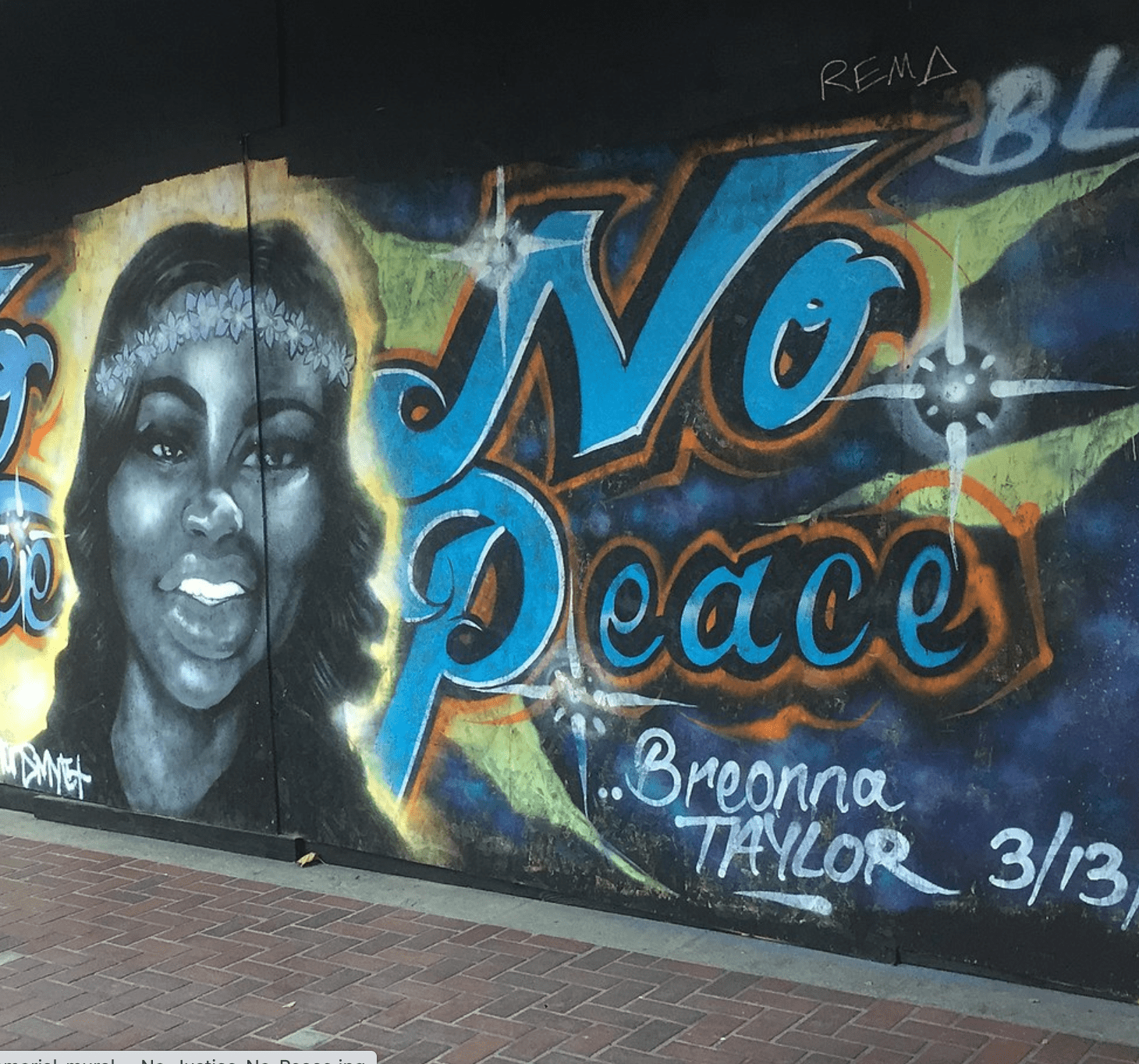
Municipal placemaking has long been an active effort to displace and erase Black people.
The horrific murder of Breonna Taylor by Louisville police in a no-knock raid — which a recent lawsuit alleges was part of a targeted effort to clear her neighborhood to make way for a multi-million dollar redevelopment project — is just the most recent and infamous example of that violence. Our homes, infrastructure, streetscapes, and architecture continue to be monuments to and venues for the revisitation of the legacy of slavery and its impacts on Black bodies.
As I sit with the connections being drawn between Breonna Taylor’s death and the brutal tactics of gentrification and redevelopment, it becomes even more clear to me that there is no way to meet this moment of civil unrest, widespread suffering, and undeniable disparity, without atonement and reparations for slavery and its ongoing impacts in our policies.
But atonement and reparations are not what we're getting. Instead, prayers and empathy for Black communities are swirling around social media. The recent commercialization of social justice lends itself to corporate declarations of privilege and solidarity, which rarely become more than gestures of inclusion and remorse. But none of these gestures make Black people in this country whole in the totality of their ancestry and lived experiences. They fall short of eradicating the hostility, greed, and hatred that killed Breonna Taylor. And the truth of the matter is, just about every industry, sector, and municipality in the United States has contributed to and is still benefiting from the systems that bred this hatred: from the Trans-Atlantic slave trade, to the middle passage, from chattel slavery to Jim Crow, from the domestic slave trade to the Great Migration, from gentrification to mass incarceration, not to mention the policies and capital that have resourced these atrocities.
My life’s work expresses itself through the field of urbanism. There are those who will struggle to accept the linkages between Breonna Taylor being killed while she slept and urbanism’s role in upholding the legacies of slavery, but I can’t ignore those linkages, because they are where I live.
Breonna and I share the same birthday. Her smile reminds me of home. Her name encapsulates everything I love about being a Black woman — noble, strong, virtuous — the attributes our society works to criminalize and suppress in Black bodies.
Breonna’s murder has moved me to consider the ways I can organize my field to do better by Black people. We should all push our organizations and professional spheres to put forth reparations and to stop being complicit in the loss of Black lives.
But first, we must consider the legacy of placemaking — and what the word "place" truly means for Black Americans.
- Place as routes designed to confine the movement of Black people being treated as cargo and goods, not as human beings
- Place as watchtowers to track and police the movement of enslaved people
- Place as town square for spectatorship of Black trauma and lynching
- Place as slave quarters for forced laborers that are not seen as worthy of decent living conditions
- Place as an agent of bondage
- Place as home to three-fifths of a human
- Place as the severing of kinship ties
Everywhere we look, urbanist practices and our built environment itself continue to be place-based manifestations of racist ideology and the institutions of slavery.
And this means that each sector, agency, and municipality must have a unique, proportional and contextually appropriate contribution to a comprehensive and ongoing reparations package. It must be developed through a sustained examination of each of these institution's historic and ongoing racist legacies. And it means they must continually search for opportunities to atone for the horrific violations of slavery in the United States.
The institutions of urbanism — all of which are complicit in the ongoing deaths and suffering of people like Breonna Taylor — need to lead the way and set the stage for this to happen.
When we speak about “reparations,” we situate the legacy of slavery in the recent past. We tend to suggest present-day trauma can be resolved by one-time interventions and blanket legislation. But what happened to Breonna Taylor — a government-sanctioned execution enacted as she slept — is evidence of widespread racist ideology that will continue to live in the hearts and minds of people in power and who maintain access to our communities long after policies shift and our cities make their first gestures of atonement.
Urbanism is complicit in infra-structural racism, so ongoing reparations must be made in the built environment as well. While the case is still being made for individual and economic reparations, and there is work we can begin to do today to end the structural racism that killed our dear sister, Breonna.
Today, I offer a set of opportunities for collective reparations within the urban planning sector that can be implemented right away.
While many call for the arrest of the officers that murdered Breonna Taylor, I am calling for the arrest of every system, structure, and policy that engendered her death — starting with urbanism.
Here are just some of the ways that the fields of urban planning, transportation planning, architecture, and civil engineering can meet this moment and answer the call for collective design-centric reparations in the built environment.
- Cargo/Freight Prohibition and Revenue Tax. Prohibition of transit storage/maintenance facilities and cargo/freight movement through communities with high concentrations of Black residents, coupled with the redistribution of a percentage of all revenues deriving from freight/rail, rideshare and gas stations to Black American descendants of slavery
- Wayfinding Recall and Mobility Fine Reversal. Removal of hostile wayfinding, directional signage and pavement markings that impose Eurocentric superiority through forced movement patterns and travel behaviors in the built environment; coupled with the cancellation of all mobility and transportation-related fees/fines imposed on Black people
- Deep Planning and No/Low-Cost Freedom of Movement. Comprehensive, long-range network and public works planning that honors freedom of movement and mode choice through design elements, coupled with free and subsidized transportation, regardless of mode
- Divest from Policing and Invest in Service Provisions. Divest from enforcement and policing as a programmatic component of urban planning, coupled with direct investments in Black service providers that meet the behavioral health and resource navigation needs of Black communities
- Public Works Prioritization and Universal Basic Income. Moratorium on quick-build transportation and land-use elements in communities that need roadway reconstruction, signal enhancements, accessible pedestrian infrastructure, drainage and floodplain planning/development, and the removal of toxic industry and public works infrastructure. Because extensive reconstruction and repairs are so disruptive and have such long construction timelines, this intervention must be coupled with a universal basic income in neighborhoods undergoing extensive repair and upgrades to prevent displacement of existing residents
- Community Planning and Workforce Reclassification. Implementation of a community planning model that reclassifies civil service planning roles by removing academic and background requirements that privilege technical training over lived experience; coupled with a direct low-barrier pathway to civil service for planners/engineers from or living directly in the proposed project areas
- Transit Enhancements and Neighborhood Network Connectivity. Enhanced transit amenities, heated/cooling shelter at stops, benches, and boarding docks in communities with high concentrations of Black residents, coupled with prioritizing comprehensive investments in neighborhood transit networks over commuter and Bus Rapid Transit routes that move non-Black commuters through Black communities at the expense of community connectivity and neighborhood network planning
- Land Trusts, Cooperatives, and Civil Fee Waivers. Fund and subsidize land trusts and cooperatives granting Black communities autonomy in project development; coupled with no-cost access to permits and technical services throughout every phase of project development (including maintenance) in perpetuity
- Land Use Reparations Boards and Redevelopment Revenue Distribution. Implementation of local and state-level land-use reparations boards to oversee funding proposals, exclusionary zoning, renewal, and revitalization practices and to establish guidelines for restorative land use measures for all zoning, capital and redevelopment projects; coupled with the allocation of a percentage of all redevelopment revenues to Black residents in the project area
- Restorative Zoning and Right-of-Return. Ban speculation and rapid re-development in Black communities. Rezone all predominantly white and high income neighborhoods to allow multi-family unit development, coupled with right-of-return programs, lien dismissals, and payouts as a direct act of atonement for the legacy and impacts of unjust sharecropper arrangements, restrictive covenants, redlining, predatory lending, and rapid redevelopment
- Impose Moratorium on Prison Development and Enact Fair Chance Housing. Impose a moratorium on the construction of new prisons and divert funds to housing stabilization, public health, education, and direct services for Black people, coupled with policies that prohibit the consideration of criminal records during housing eligibility determination processes
- Homeowner Subsidies and Real Estate Revenue Redistribution. Subsidize downpayment and revitalization costs for Black homeowners/buyers; coupled with easement/eminent domain protections and redirecting a percentage of revenues from real estate transactions to Black communities
- Surveillance Prohibition and Tech Tax. Prohibition on the use of technology affixed to infrastructure for the purposes of tracking, surveillance, and enforcement in Black communities; coupled with a redistribution of tech and data industry, rideshare, and micro-mobility revenues to Black-owned businesses and service providers
- Anti-Displacement and Racial Composition as Factors in Environmental Protections. Incorporate anti-displacement and prevention of cultural erasure as environmental protections within regulatory environmental review processes (like the National Environmental Policy Act); coupled with the removal of categorical exemptions from environmental review processes where the project footprint is in an area with high concentrations of Black residents. Limit the number of times (and the duration of time) an environmental review process can be used to authorize development in a project area
I suggest the above structural solutions for one reason: because I am not willing to wait for a personal transformation to happen in the hearts and minds of every American, and I can’t commit my life to convincing people that I am worthy of decency and retribution. Reparations and structural change are necessary, non-negotiable next steps for every industry. Breonna Taylor should be alive and her neighborhood should not have to grapple with literal displacement while mourning her death. While our elected officials convene research boards and advisory councils, cities, agencies, and organizations can act — and begin a process of true atonement today.






